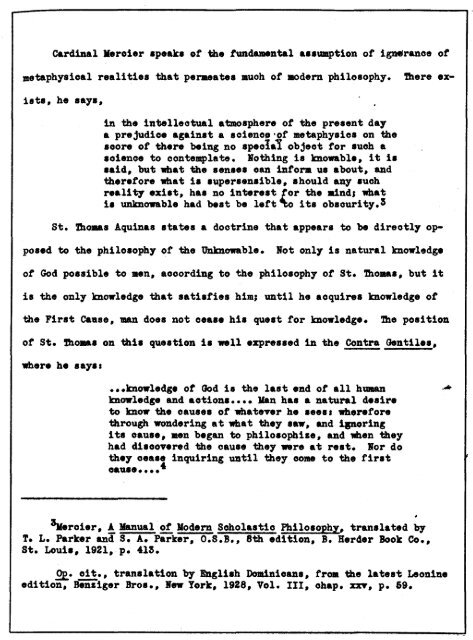Natural Knowledge of God in the Philosophy of Saint Thomas Aquina
Create successful ePaper yourself
Turn your PDF publications into a flip-book with our unique Google optimized e-Paper software.
Card<strong>in</strong>al .ercier .p.ak. ot <strong>the</strong> tundamental a •• umption <strong>of</strong> igaeranoe <strong>of</strong><br />
metaphysioal realities that per.eates much <strong>of</strong> .edem philosophy.<br />
!here.x-<br />
1.ta, he says,<br />
<strong>in</strong> <strong>the</strong> <strong>in</strong>telleotual atmosphere ot <strong>the</strong> present day<br />
a prejudice aga<strong>in</strong>.t a .cience·ot metaphysics on <strong>the</strong><br />
.core ot <strong>the</strong>re be<strong>in</strong>g no sp.cIal objeot tor suoh a<br />
.oienoe to oontemplate. Both<strong>in</strong>g i. knowable, it i •<br />
• aid, but what <strong>the</strong> sen.e. oan <strong>in</strong>tora us about. and<br />
<strong>the</strong>refore what 18 .uper.eneible, should any .uoh<br />
rea 11 ty exist, hal no <strong>in</strong>terest 'or <strong>the</strong> mnd, what<br />
il unknowable had be.t be lett~ its obsourity.3<br />
st. !homas Aqu<strong>in</strong>as .tates a dootr<strong>in</strong>e that appears to be directly opposed<br />
to <strong>the</strong> philosophy <strong>of</strong> <strong>the</strong> Unknowable.<br />
Wot only is natural knowledge<br />
<strong>of</strong> <strong>God</strong> possible to men, aGoord<strong>in</strong>e to <strong>the</strong> philosophy <strong>of</strong> St. !homal, but it<br />
is <strong>the</strong> only knowledge that I.tiltiel him; until he acquirel knowledge <strong>of</strong><br />
<strong>the</strong> Fir.t Cause, man doe. not 0 •••• hi. que.t for knowledge.<br />
!he po.ition<br />
ot St. !hO ... 1 on thi. queltion i. well exprelled <strong>in</strong> <strong>the</strong> Contra Gentile.,<br />
wh.re he lay ••<br />
••• knowl.dge ot <strong>God</strong> i8 <strong>the</strong> last end ot all huaan<br />
knowledee and action ••••• Man has a natural desire<br />
to mow <strong>the</strong> cause. ot whatev.r he Ie... wheretore<br />
through wonder<strong>in</strong>g at what <strong>the</strong>y .aw. and ipor<strong>in</strong>e<br />
ita cau.e, .en began to philo.ophic., and wh.n <strong>the</strong>y<br />
had di.ccy.red <strong>the</strong> cau.e <strong>the</strong>y wwre at r •• t. Hor do<br />
<strong>the</strong>y cea.. <strong>in</strong>quir<strong>in</strong>g until <strong>the</strong>y come to <strong>the</strong> tirst<br />
cau •••••••<br />
""'"<br />
a.ercier, ! Jlanual ot Mod.m Scholaltic <strong>Philosophy</strong>, tranllated by<br />
T. L. Parker and S. A. Parker, O.S.B., 8th edition, B. Berder Book Co.,<br />
St. Loui., 1921, p. 413.<br />
EE, • .!!!., translation by English Dom<strong>in</strong>ican., from. <strong>the</strong> latelt Leon<strong>in</strong>e<br />
edition, Benlig.r Bro •• , Hew York, 1928, Vol. III, chap. XXY, p. 69.


















